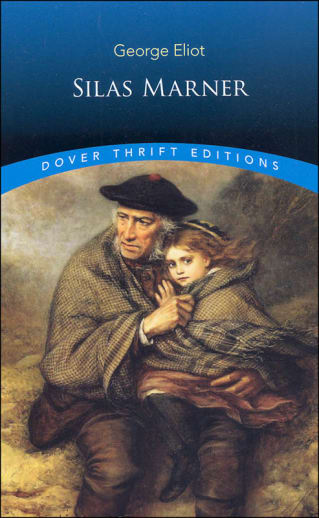When Silas Marner is framed by his best friend and therefore wrongly accused of theft, he also loses the girl he loves to that same man. Heartbroken and grieved, the weaver moves to a new town and becomes a recluse, transferring his affections to the gold he receives and hoards in return for his work. After living in bitter solitude for many years, his life is changed when he becomes the guardian of Eppie, a cheery little orphan girl who shows him love and hope again.
Silas Marner by George Eliot (Thrift Edition)
Description
As a young man, Silas Marner shut himself off from the world after being wrongly accused of theft and losing the girl he loved. Much later in life, the lonely, embittered weaver experiences two jolting events: he is robbed of his meager hoard of gold and he becomes the guardian of Eppie, a little orphan girl who makes her way to his cottage one wintry night. Eppie grows into a charming young woman who cares for the alienated Silas, helping him find love and hope in his life.
First published in 1861, this classic English novel by George Eliot (pen name of Mary Anne Evans) is widely admired for its brevity and perfection of form. It has also long delighted students of literature and general readers alike with its masterly portrait of moral and psychological behavior in Victorian England, and with its mystery, intrigue, and heartwarming denouement.
We now have the new 2016 edition in stock! Please note that this edition is not compatible with the previous edition of this course.
Like the other homeschool-friendly curricula published by the Notgrass family, Exploring Economics provides careful integration of biblical study and worldview with broad-based coverage of the topic this time, economics. Not a study of business or personal finance, this course introduces both microeconomics and macroeconomics. In addition to an overview of economic terms and concepts, a survey of the economic history of the U.S., comprehensive coverage of economic ideas, and economic issues that confront America today, there are two units that examine Gods economics including a survey of economic ideas in church history and the economic issues that Christians face today. While the course has the stated goal of providing an understanding of what economics is and what it will mean to the student as an adult, it approaches the subject from a perspective of faith in God and a reliance on the Bible as Gods infallible Word to man. While looking at both classic economic definitions as well as changing economic realities, the author obviously holds to a capitalist free-market system.
As in the other Notgrass courses, the Curriculum Package includes the Student Text and a Reader, Making Choices. The Student Text, which is very readable and understandable (an accomplishment when the subject is economics), includes 75 daily lessons (typically 4-5 pages each) divided into 15 units. Each lesson is followed by daily assignments that include reading selections from the Reader, working on a unit project (several are suggested at the beginning of each unit), reading related literature, and answering student review questions (located in the optional Quiz and Exam set). Making Choices is a collection of documents, speeches, and essays that will help the student understand the practical implications of economics. Selections include excerpts from Adam Smith, Walter Williams, George W. Bush, Henry Ford and less familiar figures. Unit projects include both writing assignments and hands-on projects designed to help the student apply what he is learning to real-life situations. For instance, in the Markets unit projects include: talking to someone in business about supply and demand, writing 300-500 words on either the price system or a given Thoreau quote, and locating five common items at five different stores and comparing the price, quality and marketing behind each. Like several other Notgrass courses, this one can be used for economics and English credit, although if you do not want to use the course for English credit, you can opt out of some of the projects and reading. The Student Review Pack set is considered optional. It includes a Student Review book with review questions on each lesson and essay questions on the literature, a Quiz and Exam Book with unit quizzes and exams, and a separate answer key. Discussions for the projects are not provided but would be helpful in some instances (some general information is provided in a brief parent guide included in the Curriculum Package). Questions, Quizzes, and Exams all tend toward reiterating textual information, while the projects tend toward analytical and evaluative activities. Please note there are some corrections and updates for the Student Review Pack available on the Notgrass website.
This is intended to be a semester course. This would be typical for high school economics and the number of units/lessons implies this. Although not overly intense, there is plenty of work here and the conscientious student will acquire a good, solid foundation not only of economic theory and practice, but also of relevant biblical principles. ~ Janice
| Product Format: | Softcover Book |
|---|---|
| Grades: | 9-AD |
| Brand: | Dover Publications |
| Author: | George Eliot |
| ISBN: | 9780486292465 |
| Length in Inches: | 8.25 |
| Width in Inches: | 5.25 |
| Height in Inches: | 0.25 |
| Weight in Pounds: | 0.3 |
| Ages: | 14+ |
| Edition: | Reprint; Unabridged |
| Pages: | 160 |

